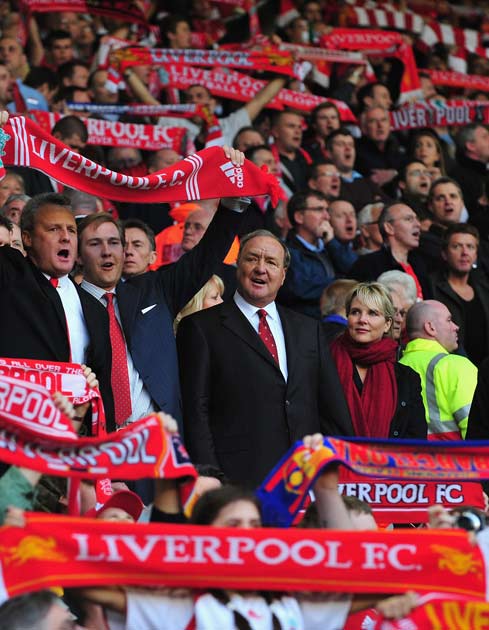Lawyers predict court defeat over Liverpool for Hicks and Gillett
Sale to Red Sox group should be approved despite owners' claims of undervaluation

British lawyers believe that Liverpool's American owners Tom Hicks and George Gillett face a supremely difficult task convincing a High Court judge that the sale of the club to New England Sports Ventures (NESV) is illegal, a move which they will attempt in order to prolong their unpopular tenure on Merseyside.
It is much needed good news for a club that continues to face huge on-field challenges. Fernando Torres is understood to be harbouring doubts about where his future lies, even though he appeared yesterday to be winning his battle to shake off the adductor muscle injury he sustained in the home defeat to Blackpool and should be fit for the crucial Goodison derby on Sunday week.
Lawyers for the English contingent of the Liverpool board, who are awaiting the 24-hour notice they will receive of the High Court hearing which will rule on the legality of the club's sale to NESV, do seem to have a strong case. Legal opinion on the sale – which Hicks and Gillett insist has been rendered invalid because they had suspended two of the directors who voted in the 3-2 decision – is that the Americans have handed non-executive chairman Martin Broughton a huge court-room asset by signing off to him the right to hire and fire directors.
"If that undertaking is in place, signed and sealed, [he] has a very solid case to seek a declaration that the board are entitled to sell the club," Andrew Nixon, a partner for Thomas Eggar, said yesterday. "If they have broken an undertaking that is a factual issue."
The articles of association, in which Broughton's right to hire and fire directors and the current owners' undertaking not to take any action to frustrate a sale are enshrined, are critical to the case, Mr Nixon added. "If they show that [Broughton] has powers of process in both the sale and appointment of directors, it is going to be very, very hard for Hicks and Gillett to get around that."
Asked by The Independent 48 hours ago whether the undertakings were indeed signed and sealed by Hicks and Gillett, Broughton replied: "They signed them and made them to RBS [Royal Bank of Scotland] as a condition of the lending extension [which gave Hicks and Gillett an additional six months' leeway on their £237m loans]." Broughton added that the undertakings "changed the articles [of] the company." Puzzlingly, there is no mention of these vital changes in the articles of association for Kop Football, the holding company which approved the NESV sale, though it is quite possible that they have been signed off through additional papers.
Further details have emerged about how NESC beat off a rival bid from Asia on Tuesday. NESC, owners of the Boston Red Sox, increased the cash element of their £300m bid to £240m when both interested parties had tabled the same offer for Liverpool.
Hicks and Gillett's case will centre on whether the £300m sale to NESV, who are today expected to be cleared by the Premier League as fit and proper owners, represents an undervaluation of the club. Under the 2007 Companies Act, it is the fiduciary duty of any director to secure the best value for a company. "If they can give proper evidence that the £600m price they are talking about is realistic, they have a case," Mr Nixon added. "If they can't prove there could be a better sale, they are going to have a very, very difficult job."
Broughton has not ruled out the pair being able to demonstrate that someone, somewhere values the club at £600m. "I never like to put anything beyond them," he said on Tuesday. But Liverpool would be staggered if, after a year-long search for buyers ultimately tempted only two takers, Hicks and Gillett manage to demonstrate that there are others out there ready to pay twice as much.
If the legal undertakings cannot be proven – and as yet no written evidence of them has been seen by this newspaper – then the High Court judge's decision will revolve around the more subjective decision of what constitutes work to "promote the success of a company." Here, the owners may also have problems.
Bernd Ratzke, head of corporate law at Dawsons, said: "It seems unlikely that the courts will halt the board's plans. Under the Companies Act 2006, Hicks and Gillett would have to demonstrate that the directors are not acting to 'promote the success of the company' and, given that the club is facing administration within a matter of days, that will be a difficult argument to make."
Even if Hicks and Gillett do win, it seems they would secure only a brief reprieve since RBS is likely to call in its £237m loans if it is not paid by the due date of next Friday. If they have a white knight, he has a week to ride to the rescue.
Subscribe to Independent Premium to bookmark this article
Want to bookmark your favourite articles and stories to read or reference later? Start your Independent Premium subscription today.

Join our commenting forum
Join thought-provoking conversations, follow other Independent readers and see their replies